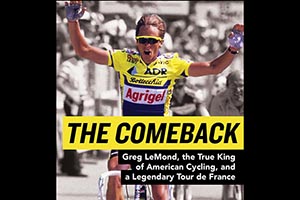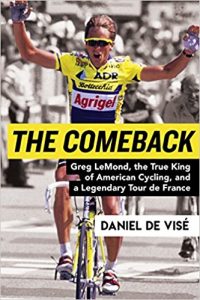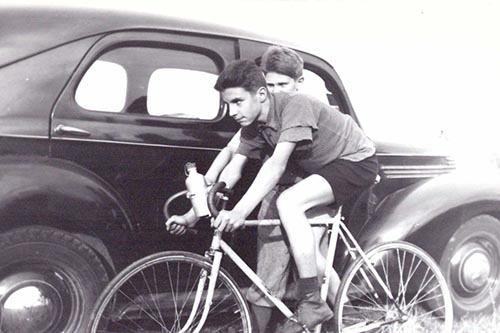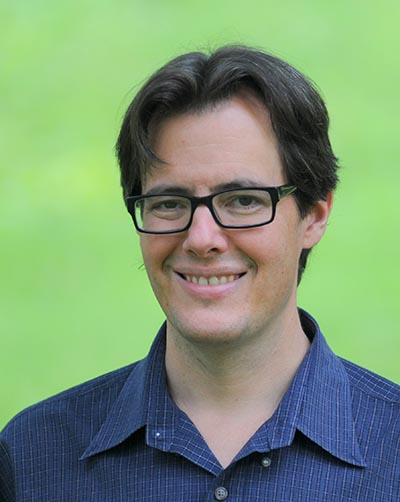De Visé ’89 on the Tour de France, Greg LeMond, and Heroes (Addendum 10/02/2019)

 In The Comeback: Greg LeMond, the True King of American Cycling, and a Legendary Tour de France (Atlantic Monthly Press, June 2018), journalist Daniel De Visé ’89 has written “a sprint through a big swatch of cycling history, focusing on racer Greg LeMond’s triumphant return from disaster,” according to Kirkus Review. In this Q&A below, he traces his path from a childhood love of the sport to Wesleyan, and through the journey of this book. Read an excerpt from his book online.
In The Comeback: Greg LeMond, the True King of American Cycling, and a Legendary Tour de France (Atlantic Monthly Press, June 2018), journalist Daniel De Visé ’89 has written “a sprint through a big swatch of cycling history, focusing on racer Greg LeMond’s triumphant return from disaster,” according to Kirkus Review. In this Q&A below, he traces his path from a childhood love of the sport to Wesleyan, and through the journey of this book. Read an excerpt from his book online.
Q: Tell us about your time at Wesleyan. What was your major?
A: It was as much fun as I’ve ever had in my life. I had grown up in Chicago, in the city, and when I arrived on that picture-postcard campus, it felt like some kind of academic Disneyland. I lived in West College, where, on certain occasions, an entire dormitory room would be assembled upside-down on a basement ceiling. I lived on the same first-year hall as Stephen Trask ’89, cocreator of Hedwig and the Angry Inch and This Ain’t No Disco. Another friend and I created a ’60s show for WESU. I majored in philosophy, but I took so many classes in history and religion that I almost ended up short of actual philosophy credits. I met my enchanting future wife, Sophie Yarborough ’88, in a history classroom. I took an extra course here and there and finished in three years (very much in the spirit of President Roth’s degree-in-three program). I used the extra cash to pay for journalism school at Northwestern.
Q: You’ve written several biographies. What sparked your interest in the genre—and what are your favorites (authors or actual titles)?
A: I’ve written or cowritten three books, and all have extensive biographical content, but none is pure biography. The first, I Forgot to Remember (Simon & Schuster, 2014), was the memoir of an amnesiac I’d profiled in the Washington Post as a reporter. The second, Andy & Don (Simon & Schuster, 2015), was a dual biography, chronicling the lifelong friendship of actors Andy Griffith and Don Knotts. I wrote that really for Don, who was my brother-in-law. The Comeback is more a work of narrative nonfiction, similar in structure to The Boys in the Boat or Seabiscuit—both personal favorites. It chronicles the rise of Greg LeMond, an American outsider, to the top of the European cycling sport; his near-death, in 1987, in a hunting accident; his incredible return to the top of cycling and victory in the greatest Tour de France ever staged, in 1989; and, lastly, his epic feud with Lance Armstrong, whom LeMond accused of doping, a battle that ended with LeMond’s vindication a few years ago. The book encompasses the first comprehensive biography of LeMond, and also a somewhat shorter bio of Laurent Fignon, the Frenchman whom LeMond defeated in ’89. The narrative lingers for several chapters on the spellbinding ’89 Tour.
I think I gravitate toward biographical books because I feel comfortable recounting people’s lives; I did that every day, thousands of times in all, as a newspaper reporter. These days, I actually read a lot more narrative nonfiction than straight biography—I just finished The Worst Hard Time by Timothy Egan, about the Dust Bowl, which was amazing—and I can certainly recommend Keith Richards’s Life to anyone who hasn’t read it.
Q: What sparked your interest in Greg LeMond? How did that interest grow into The Comeback?
A: I grew up in a home where bicycle racing was a passion. My father was a Belgian immigrant, and Belgians are crazy about cycling. In 1935, my father, uncle, and grandfather rode their bicycles across the continental United States. My father raced bicycles later on, and we attended weekly bicycle races as spectators throughout my childhood. We watched the Tour on television, and LeMond’s ’89 victory was a big deal in our household.

The idea of writing about Greg came to me a few years ago when I was searching for the right topic for my next book. I remembered all he had been through, and it struck me that the narrative arc of his life would make a great book. It’s full of the sort of conflict you learn about in English class: First, Greg overcomes the pain and shame of childhood sexual abuse; next, he squares off against the entire French nation to conquer the Tour; then, he fights back from the brink of death to win the Tour again, a contest generally regarded as the greatest Tour ever staged; and then he endures a decade-long feud with Lance Armstrong, an episode that leaves him ostracized and exiled from the cycling community, until Armstrong finally admits guilt and LeMond is embraced anew as the true king of American cycling.
Q: LeMond was the first American to win the Tour de France, back in 1986, after finishing in third and second place in his previous two tries. Can you describe the worldwide reaction to his historic win?
A: The response to LeMond’s (and America’s) first Tour de France victory was massive, at least by the standards of American cycling. Greg’s achievement made the front page of The New York Times and the cover of Sports Illustrated and drew coverage in Time, People, and Rolling Stone. The win made LeMond a celebrity, if not quite a household name. (Contrast this with Lance Armstrong’s first Tour victory in 1999, after coming back from cancer, a triumph embraced by millions of cancer survivors and that made Lance perhaps the best-known American athlete since Michael Jordan.) LeMond was already well-known in Europe, and the Tour victory placed him on a short and exalted list of cyclists who had won the great race; in France and Belgium, Ireland and Italy, Greg would never have to buy a drink again.
Q: Lance Armstrong is the name most Americans associate with the Tour de France–and everyone knows the story of Armstrong’s comeback. Yet very few are aware of LeMond and what happened to him after his 1986 win—an incident that caused him to miss the next two races before coming back to win consecutive titles in 1989 and 1990. Can you tell us what happened and how he was able to regain his title?
A: That both Greg LeMond and Lance Armstrong returned from near-death to the top of the cycling sport seems an astonishing coincidence: I have not been able to find a single example of another athlete coming back from such grievous injury or illness to the apex of any aerobic sport. LeMond was out on a hunting trip in April 1987 when a relative accidentally shot him. Doctors said he came within 20 minutes of bleeding to death. A helicopter transported him from the rural ranch to the California capital of Sacramento, where he was stabilized and treated. Upon his release from the hospital, Greg struggled simply to walk across a room. Over many agonizing months, he learned to ride a bicycle again, and then to race. I don’t believe he had won a single bicycle race by the time he entered the 1989 Tour, having recovered most of his former strength. His rival at that Tour was Laurent Fignon. They fought fiercely for three weeks. On the final day of racing, Greg logged the ride of his life, beating Fignon to the line by eight seconds, the closest finish in the history of the Tour.
Q: What was the most interesting fact or story you learned in researching LeMond? The most surprising?
A: I was merely a fan of cycling, not an expert and certainly not a cycling journalist. Thus, most of the revelations in my book were revelations to me, too. When I started work on the book, I had no idea how close to death Greg had come after the shooting. I knew almost nothing about the sexual abuse that I now see as crucial to inspiring his cycling career—simply put, the pain of cycling took his mind off of everything else. I knew very little of the great love story between Greg and Kathy, his wife of 38 years. And I knew little of the powerful father-son bond between Greg and Bob LeMond: they trained together and raced together, each inspiring the other, Bob managing Greg’s career. The biggest surprise might have been the depth and intensity of the feud between Greg and Lance. I knew there’d been a rift, but I had no idea the conflict had more or less defined Greg’s life for a dozen years.
Q: It’s perilous to confront someone doing wrong—especially when that person is seen as an icon and hero. What do you think drove LeMond to confront Lance Armstrong about his doping? How did that confrontation impact LeMond, both professionally and personally?
A: At the moment when LeMond publicly questioned Armstrong’s record, in 2001, Armstrong was probably the most popular athlete in America. Millions of Armstrong’s American fans greeted LeMond’s allegations with shock and disbelief. Most of Lance’s fans in the States knew very little about professional cycling and probably couldn’t have named his European rivals. In Europe, by contrast, cycling fans were all too familiar with doping, as many of the top cyclists had been accused of doping by 2001. I think it’s fair to say that many European fans assumed Lance doped, along with most of his rivals. In that context, I think Greg felt he had no choice but to speak honestly about the many rumors he had heard about Lance and his team; he was speaking to the cycling community as much as to the American public. Armstrong and his entourage responded to LeMond’s allegations by turning much of the American cycling community against him. Greg found himself no longer welcome at trade shows, rebuffed by sponsors, and rejected by fans. He lived in exile from the small and close-knit American cycling world for more than a decade—until Lance went on television with Oprah and admitted what Greg had alleged. Those were dark years for Greg and his family. Greg bought a guard dog, succumbed to various vices, and took to recording phone calls. I think he suffers now from a form of PTSD as a result of what he’s been through.

Q: For years, Armstrong overshadowed LeMond and his accomplishments. Today, LeMond stands alone as the only American to win the Tour de France—an event that he won three times. What do you hope this book accomplishes?
A: I would like LeMond to be as famous for the Tours he did win as Armstrong is for the ones he didn’t. I would like to raise his currency, elevate his brand. I’d also like to reacquaint readers with a golden age of bicycle racing in America. We all had such warm feelings for the sport back in the era of Breaking Away, and now people are so jaded toward professional cycling. In truth, I think the cycling sport has gone through much the same crisis as baseball. In both sports, you had an era (ending around 1990) when many competitors took various substances, but nothing powerful enough to transform a middling athlete into a star. And then, starting around 1990, new and more potent forms of dope made it possible for athletes to do the impossible—hit 70 home runs, or win seven Tours de France. That problem hasn’t really been solved in baseball or in cycling. But no one in baseball really questions the achievements of a Hank Aaron or a Mike Schmidt or a Steve Carlton. And no one in cycling really questions the feats of a Laurent Fignon or a Bernard Hinault or a Greg LeMond.
Q: What do you think about the sport today—and do you have a “favorite” rider? Who do you think is the closest to LeMond today?
A: So much suspicion hangs over the Tour de France today that it’s hard to watch the race without questioning any performance that seems a little superhuman. Chris Froome and his Team Sky, who are dominating the 2018 Tour, have come under withering criticism. Froome failed a drug test for an asthma medicine last year, but I think fans harbor deeper suspicions about what other means the team might have exploited to seize five Tour victories in the past six years. No one in the current peloton reminds me much of LeMond. I’m a big fan of Cadel Evans, the Australian who won the Tour in 2011. I think he raced clean. As for pure natural talent of the LeMond variety, I always thought the German racer Jan Ullrich, who won the Tour in 1997, had plenty of that, as well as Alberto Contador of Spain, a two-time winner in 2007 and 2009. Andy Schleck of Luxembourg, who won in 2010 (but only after Contador was disqualified for dope!), was another favorite and has a relatively untarnished reputation. But the easy answer is that there will never be another LeMond.
Q: Has LeMond read the book?
A: I know he was planning to read it. I’ll have to ask him the next time we talk!
Q: What are you working on now?
A: My next book, under contract to Grove Atlantic, is a biography of B.B. King, the Delta sharecropper who ascended to a global ambassador of American music, and who more or less created the guitar hero. Look for it in 2020!
Addendum: On Sept. 19, 2019, Dan de Vise sent this update:
“I wrote the Greg LeMond bio in hope Greg might finally get the recognition he deserves, and it looks like that might be happening. The House of Representatives is scheduled to vote this afternoon on a bill that would award Greg the Congressional Gold Medal. The measure would still have to get past the Senate and the president, but that’s now looking increasingly likely.
“The Gold Medal is one of our two highest civilian honors, along with the Presidential Medal of Freedom. Congress created it as the “highest expression of national appreciation for distinguished achievements and contributions.” George Washington got one. Recent recipients include Jackie Robinson, Mother Teresa and Pope John Paul II.
“Greg is up for the medal because of Rep. Mike Thompson, from Napa. Congressman Thompson first contacted me last October. He had read my book, and he wanted to find a way to recognize Greg as an American hero. We corresponded for several months, and I learned in June that he had decided to introduce legislation to award the Gold Medal to Greg. I helped his staff with the wording.
“I always felt Greg’s achievement was bigger than cycling — to me, it’s the greatest comeback in sports and just a great American story. Congressman Thompson agrees. The medal would put Greg in the company of our great athlete-heroes: Jackie Robinson, Jesse Owens and Roberto Clemente, to name a few.”
Dan invites you to contact him at ddevise@gmail.com for further information on this award.

